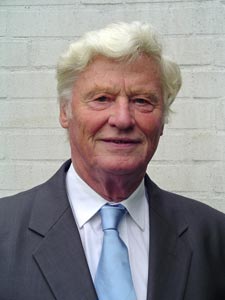When the media give rise to fear and hate
by Professor Dr Eberhard Hamer, Mittelstandsinstitut Niedersachsen e.V.
Since 24 February 2022, our media have been promoting hate propaganda against Vladimir Putin and Russia. Since then, state radio, television and the press have been drumming up hatred against Putin and Russia, demanding punitive measures, sanctions, arms deliveries and that our politicians should queue up for photo opportunities with Zelensky, as other NATO officials do.
The fact that this new propaganda hero had disinvited the German president from this procession because of his “former understanding for Russia” was not criticised as impertinent by the German media, but even commented on with understanding.
Those of our politicians who had previously organised cheap energy supplies from Russia for us (Schröder, Schwesig), have now been persecuted by the Atlantic-controlled propaganda as friends of Putin and Russia, i.e., as cronies of hateful people and peoples. Yet they only dutifully tried to pursue German interests and did not go along with the new trend of exchanging cheap Russian for expensive American energy in Germany, i.e., of sacrificing our previous cheap energy basis of prosperity to our own detriment because of commanded hatred against Russia.
Artists were dismissed just because they were Russian (music director in Munich) or were no longer allowed to perform (Anna Netrebko).
The hatred aroused by the media against Putin and Russia has now gone so far that even our excellently integrated Russian Germans are once again defamed, marginalised and insulted.
On the orders of the USA, Russian assets are now being expropriated by all NATO states, even private assets of Russian citizens. Corrupt Zelensky broadcasts his intention to use these assets to “rebuild Ukraine”.
The media combine all reports on Russia with vilifications filled with hate: they no longer speak of war, but of “Putin’s criminal war of aggression”, no longer of Russia, but of “bellicose Russia” and no longer of armies, but of the “criminal Russian army” on the one hand and of the “heroic Ukrainian army” on the other. Something negative is always added so as to fill the population with hatred.
On the other hand, the comedian Zelensky, who is omnipresent in politics and the world’s media, and his impudent ambassador in Germany have been hailed as stars, and their increasing demands for money and weapons presented as self-evident, while the German chancellor’s cautious hesitation has been presented as irresponsible.
In this, history has not, as Zelensky claims, laid upon us “a special debt and therefore an obligation” to participate in the war on the side of Ukraine. On the contrary, history should have taught us to exercise special caution before any participation in war, as did Chancellor Olaf Scholz. Mr. Scholz’s attitude of caution is the most responsible attitude of our current political leadership, namely not to let Germany get dragged into another war.
In a conference of the Mittelstandsinstitut Niedersachsen on the Ukraine war, two almost irreconcilable opinions prevailed:
- One side demanded further punitive measures against Russia because Russia had started the war and invaded Ukraine in violation of international law. Its advocates hoped that the punitive measures would either lead to Russia and Putin giving in or, like Annalena Baerbock, wished to “permanently damage Russia”, i.e., an escalation into a world war.
- The other side asked what business the war in Ukraine was to us Germans anyway, and did not believe that the war could be ended by punitive measures, but only by negotiations and de-escalation. German participation in the war was counterproductive, they said, as well as economic sanctions, as these caused the most harm to ourselves (permanent increase in energy prices, halting foreign trade with Europe’s most important supplier of raw materials). They saw the more than three billion euros of German payments and the German arms deliveries for the Ukraine as a confrontation contrary to our interests and as a participation in the war that was far too risky.
This discussion afterwards brought into focus the question whether a government should be allowed to pay German money for foreign wars in foreign interests at all or whether this is a misappropriation of public funds, for which German citizens and payers are being asked to make sacrifices and are being deprived of more important state tasks such as the rehabilitation of our ramshackle infrastructure.
Despite a heated discussion at the beginning, it was at least possible to reach agreement on the following points:
- that the hatred stirred up by the media with moral arguments can never be justified, as its effects already show,
- that we may not neglect or even harm our own interests in the pursuit of foreign objectives (USA, NATO),
- and that it is also right in our long-term interest to exercise moderation like Scholz does, because at some point the war will be over and we will have to negotiate about supplies again with Europe’s largest owner of raw materials.
Why do our media spread hate instead of contributing to peace and promoting negotiations? Why do they support hate politicians instead of moderation politicians? What power directs these media functionaries to their hate campaign? But also, why do we put up with this? Why do voices of peace and efforts for reconciliation not have their say?
It is not in Germany’s interest if the war lasts longer, even less so if it “will last a long time”, as according to the USA’s ideas. Economically, Germany is already the biggest Western loser in the Ukraine war. The warmongers have imposed economic sanctions that are hurting us now and will hurt us more than Russia in the long run. •
